Adam AbateProfessor of Bioengineering and Therapeutic Sciences, University of California-San Francisco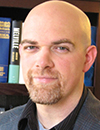 Dr. Adam Abate is a physicist who brings a unique research program to UCSF. His research employs microfluidics for high-throughput biological applications. He has developed microfluidic methods to create emulsions that consist of droplets of very precise and consistent sizes and to manipulate the processing and contents of individual droplets in different ways. The droplets are used to create micro-compartments, which can be loaded with single cells and other active materials, such as drugs, nutrients, and assay reagents. By chaining together different microdevice components, the droplets can be used as tiny "test tubes" for performing chemical and biological reactions. This allows multiple, independent reactions to take place at the rate of thousands per second, while using minuscule amounts of total reagent. Adam is using this approach for directed evolution, genetic sequencing, and cell sorting. |
Eric DieboldWW Vice President, Research and Development, BD Biosciences Eric Diebold is the Worldwide Vice President of Research and Development for BD Biosciences, where he leads all aspects of product and technology development for the Biosciences business unit within Becton Dickinson and Co., one of the world’s largest medical technology companies. Eric has been with BD Biosciences for the past 7 years, where he has served in roles of increasing responsibility within the R&D function. Prior to BD, Eric was the CEO and Founder of Omega Biosystems Incorporated, which was acquired by BD in 2017. Eric received his BS in Electrical Engineering and Physics from Duke University, and his PhD in Applied Physics from Harvard University. He lives in Menlo Park, CA with his wife and three sons. |
Steven C. GeorgeEdward Teller Distinguished Professor and Chair, Department of Biomedical Engineering, University of California-Davis Steven C. George, M.D., Ph.D. is a Professor of Biomedical Engineering at the University of California, Davis. He received his bachelors degree in chemical engineering in 1987 from Northwestern University, M.D. from the University of Missouri School of Medicine in 1991, and Ph.D. from the University of Washington in chemical engineering in 1995. He was on the faculty at the University of California, Irvine for 19 years (1995-2014) where he pursued a range of research interests including pulmonary gas exchange, lung mechanics, vascularizing engineered tissues, and microphysiological systems. The NIH FIRST award in 1998 and the CAREER and Presidential Early Career Award for Scientists and Engineers (PECASE) from the National Science Foundation in 1999 have previously recognized his work. While at UCI, he served as the William J. Link Professor and founding Chair of the Department of Biomedical Engineering (2002-2009), the Director of the Edwards Lifesciences Center for Advanced Cardiovascular Technology (2009-2014), and was the PI on a T32 predoctoral training grant from the National Heart Lung and Blood Institute. In 2014 he transitioned to become the Elvera and William Stuckenberg Professor and Chair of Biomedical Engineering at Washington University in St. Louis, and in 2017 moved to the UC Davis. He was elected a fellow in the American Institute of Medical and Biological Engineering (AIMBE) in 2007, a fellow of the Biomedical Engineering Society in 2017, has published more than 140 peer-reviewed manuscripts, and co-founded two early start-up companies. His work is currently funded by grants from the NIH that focus on creating tissue engineered models of the cardiac, pancreas, bone marrow, and cancer microenvironments using induced pluripotent stem cell and microfabrication technology. |
Jim HeathPresident, Institute for Systems Biology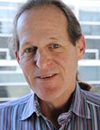 Dr. James R. Heath is President and Professor at Institute for Systems Biology in Seattle. Heath also has the position of Professor of Molecular and Medical Pharmacology at UCLA. Formerly, he was the Elizabeth W. Gilloon Professor of Chemistry at Caltech, and served as co-director of the Parker Institute for Cancer Immunotherapy at UCLA until 2017. Heath has had a profound impact on ISB since taking over leadership in 2018. He continues to make important discoveries in the field of cancer immunotherapy, and in 2022 was selected to lead a National Cancer Institute Comprehensive Cancer Center to study sequential targeted inhibitors and immunotherapies. At the beginning of the COVID-19 pandemic, Heath quickly pivoted the focus of his lab and collaboratively worked with others within and beyond ISB to uncover secrets behind COVID-19 and long COVID. He published research that has changed how COVID-19 is understood, and now leads the Pacific Northwest consortium of the NIH-funded RECOVER study, which aims to understand the long-term effects of COVID. Heath received his PhD in 1988 from Rice University, where he was the principal graduate student involved in the discovery of C60 and the fullerenes. He was a Miller Fellow at UC Berkeley before joining the research staff at IBM Watson Labs in 1991. He took a faculty position at UCLA in 1994, and moved to Caltech in 2003. He has received several awards and honors, including the Irving Weinstein Award from the American Association of Cancer Researchers, and the Sackler Prize in the Physical Sciences. In 2009, he was named one of the top seven innovators in the world by Forbes Magazine. Heath has founded or co-founded several companies, including PACT Pharma, Integrated Diagnostics, Indi Molecular, CTI Molecular Imaging (acquired by Siemens in 2005), Sofie Biosciences, Isoplexis, and NanoSys. |
Roger KammCecil and Ida Green Distinguished Professor of Biological and Mechanical Engineering, Massachusetts Institute of Technology (MIT)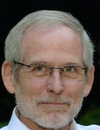 Kamm is currently the Cecil and Ida Green Distinguished Professor of Biological and Mechanical Engineering at MIT, where he has served on the faculty since 1978. Kamm has long been instrumental in developing research activities at the interface of biology and mechanics, formerly in cell and molecular mechanics, and now in engineered living systems. Current interests are in developing models of healthy and diseased organ function using microfluidic technologies, with a focus on vascularization, metastatic cancer and neurological disease. Kamm has fostered biomechanics as Chair of the US National Committee on Biomechanics (2006-2009) and of the World Council on Biomechanics (2006-2010). For 10 years, he was Director of the NSF Science and Technology Center on Emergent Behaviors of Integrated Cellular Systems. He is the 2010 recipient of the ASME Lissner Medal and the 2015 recipient of the Huiskes Medal, both for lifetime achievements, and was the inaugural recipient of the ASME Nerem Medal for mentoring and education. He was elected to the National Academy of Medicine in 2010 and Engineering in 2022. Kamm is co-founder of AIM Biotech, a manufacturer of microfluidic systems for 3D culture. |
Abraham LeeChancellor’s Professor, Biomedical Engineering & Director, Center for Advanced Design & Manufacturing of Integrated Microfluidics, University of California-Irvine Abraham (Abe) P. Lee is Chancellor’s Professor of Biomedical Engineering (BME) and MAE at the University of California, Irvine (UCI). He served as department chair for BME from 2010-2019. He is currently Director of the NSF I/UCRC “Center for Advanced Design & Manufacturing of Integrated Microfluidics” (CADMIM). Dr. Lee served as Editor-in-Chief for the Lab on a Chip journal from 2017-2020. Prior to UCI, he was Senior Technology Advisor at National Cancer Institute (NCI), Program Manager in the Microsystems Technology Office at DARPA (1999-2001), and a group leader with Lawrence Livermore National Lab (LLNL). Dr. Lee’s current research focuses on integrated microfluidic systems for precision medicine including liquid biopsy, microphysiological systems, cell engineering, and immunotherapy. His research has contributed to the founding of several start-up companies. He is inventor of over 60 issued US patents and is author of over 130 journals articles. Professor Lee was awarded the 2009 Pioneers of Miniaturization Prize and is fellow of the National Academy of Inventors (NAI), the American Institute of Medical and Biological Engineering (AIMBE), the Royal Society of Chemistry (RSC), the American Society of Mechanical Engineering (ASME), the International Academy of Medical and Biological Engineering, and the Biomedical Engineering Society (BMES). |
Noah MalmstadtProfessor, Mork Family Dept. of Chemical Engineering & Materials Science, University of Southern California Noah Malmstadt is Professor at the University of Southern California. He received a BS in Chemical Engineering from Caltech and a PhD in Bioengineering from the University of Washington. Following postdoctoral work at UCLA, he joined the Mork Family Department of Chemical Engineering and Materials Science at USC in 2007. Malmstadt is the recipient of a 2012 Office of Naval Research Young Investigator award. His research focuses on microfluidic strategies to facilitate material fabrication and biophysical analysis. He has pioneered the integration of ionic liquids as solvents in droplet microreactors and the application of microfluidic systems to synthesizing biomimetic cell membranes. Microfluidic analytical techniques he has developed include methods for measuring the permeability of cell membranes to druglike molecules and techniques for measuring ionic currents through membrane proteins. |
Gregory NordinProfessor, Brigham Young University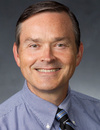 Professor Greg Nordin joined the faculty of the Electrical & Computer Engineering Department at Brigham Young University in 2005. From 1992 to 2005 he was at The University of Alabama in Huntsville (UAH) where he was the founding director of the university's Nano and Micro Devices Center, which was created as an independent research center by the University of Alabama System Board of Trustees. While director of the center, he created a 7,600 sq. ft. cleanroom facility for nano and microfabricated devices to pursue research activities in photonics, MEMS, microfluidics, and sensors. Prof. Nordin has led numerous large research programs, and has been principal investigator on research grants from government and industry totaling $18M. He is the recipient of the National Science Foundation CAREER award (1996) for promising young faculty, and twice received the UAH Outstanding Researcher Award as well as the UAH Foundation Award for Research and Creative Achievement. Prof. Nordin's current research is focused on developing 3D printing for microfluidic devices and applications. In March 2018 Prof. Nordin gave a TED talk on his group's work, which is available at https://www.youtube.com/watch?v=T122fzOEVYE. |
Steve SoperFoundation Distinguished Professor, Director, Center of BioModular Multi-Scale System for Precision Medicine, The University of Kansas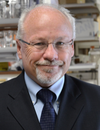 Prof. Soper is currently a Foundation Distinguished Professor in Chemistry and Mechanical Engineering at the University of Kansas, Lawrence. Prof. Soper also holds an appointment at Ulsan National Institute of Science and Technology in Ulsan, South Korea, where he is a World Class University Professor. He is also serving as a Science Advisor for a number of major worldwide companies. Prof. Soper is currently on the Editorial Board for Scientific Reports and Journal of Micro- and Nanosystems. |
Valérie TalyCNRS Research Director, Professor and Group leader Translational Research and Microfluidics, Université Paris Cité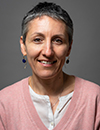 V. Taly is a CNRS research director and group leader of the Translational Research And Microfluidics team within the clinical oncology research unit MEPPOT (personalized medicine pharmacogenomics and therapeutic optimization) in the Cordeliers Research Center (university Paris Cité). Her team performs interdisciplinary researches aiming at developing and validating microfluidic tools for cancer research in close collaboration with clinicians and researchers in oncology and toxicology. Since 2008, she developed droplet-based digital procedures for Cancer diagnosis. Recently, her research has been dedicated to the clinical validation of droplet-based microfluidics for the non-invasive detection of Cancer biomarkers, the highlighting of new Cancer Biomarkers and the development of original tools and procedures for their detection with applications in personalized medicine, cancer recurrence detection and cancer diagnostics. She is co-founder of EMULSEO (2018) and METHYS DX (2021) start up companies. |
David WeitzMallinckrodt Professor of Physics and Applied Physics, Director of the Materials Research Science and Engineering Center, Harvard University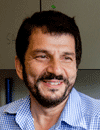 Professor David Weitz received his PhD from Harvard. He worked at Exxon Research and Engineering as a research physicist for nearly 18 years, and then became a Professor of Physics at the University of Pennsylvania. He moved to Harvard at the end of the last century, and is currently Professor of Physics and Applied Physics. He is also the director of Harvard's Materials Research Science and Engineering Center. Several start-up companies have come from his lab to exploit some of the technological applications of his work. |




